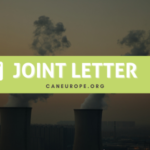This letter, signed by 39 organisations, was sent to the World Bank in relation to the board discussion on a loan to the Turkish company Botas for the construction of the Trans-Anatolian Gas Pipeline (TANAP). In the letter, several social, environemntal and human rights issues with the TANAP are raised, and the organisations urge the board to at the very least postpone this discussion until the martial law inTurkey is cancelled; the NGO legislation in Azerbaijan is modified as requested by the EITI; and democratic participation in both countries is restored. Clearly, given the violations of World Bank Safeguard requirements during project appraisal, this project should not qualify for a Board vote.
Re: Urgent – December 20th board discussion on loan to the Trans-Anatolian Gas Pipeline
Dear members of the board of the World Bank,
We are writing to you in relation to the upcoming board discussion on a loan to the Turkish company Botas
for the construction of the Trans-Anatolian Gas Pipeline (TANAP). We are very concerned to learn that the
World Bank decided to schedule the discussion for December 20th, in a context of political crisis and
crackdown on civil society and media in Turkey1. Arbitrary arrests of thousands of people, closing of
newspapers, limited freedom of civil society and continuous martial law became the normality after the
attempted coup, exacerbating an already difficult context. In addition, we have strong concerns about
violations of the implementation of the World Bank’s due diligence and safeguards.
We think that this is not the right time to decide on a loan for a project that will shape the future of the
country while there is no possibility of civil society’s scrutiny and monitoring.
TANAP is a key component of the Southern Gas Corridor, a 3,500 km long pipeline designed to transport
gas from Azerbaijan to Europe at the estimated cost of USD 45 bn. It is the largest infrastructure under
construction in the country, with estimated cost of about USD 10 bn. The Azeri state company Socar is a
majority shareholder of the TANAP consortium with 58% of shares, Botas holds 30% and British
Petroleum 12%. The Southern Gas Corridor has been heavily criticised for its harmful environmental,
social and human rights impacts by civil society around Europe.
The Situation in Turkey:
We note that World Bank Safeguards, including for Country Systems assessment, apply to this project,
however they do not appear to have been properly implemented during the appraisal phase. Project
documents identify some of the insurmountable gaps between World Bank Safeguard requirements for
public consultation, livelihood restoration, human rights and gender rights, and problematic
implementation and subsequent compensation by TANAP and its contractors through the Host Government
Agreement in Turkey.
For instance, the Resettlement Action Plan (RAP) opens with the following:
„There are several gaps between international and local standards in regard to the preparation of the
Resettlement Action Plan (RAP). First, under Turkish law, RAP is not a requirement for investments that
cause economic and physical displacement. Similarly, social impact assessment (SIA) is a requirement
under international policy, but not under Turkish law. In addition, within the national legal framework
there is a lack of specific requirements for consultation and disclosure of RAPs and SIAs.”
In summary, we identify the following gaps in the Turkish legislation according to the RAP for the
TANAP project:
1. No provisioning in Turkish Law for livelihood restoration
2. No studies, surveys and consultations on affected communicates are required
3. No provision regarding the minimization of resettlement in Turkish Laws
4. Resettlement rights are limited to certain categories of Persons Affected by Projects and not to all project affected
individuals
5. No legal provision ensuring the project proponents prepare social impact assessment and/or resettlement action
plan under Turkish Law.
6. No legal provision is made in the Turkish legislation except for those that opt for State-Assisted Resettlement.
Lost homes are not compensated by use of replacement value.
7. Only the legal owners can receive monetary compensation (via the expropriation of lands).
8. The pasture and meadow losses of the families or the associated income loses of villages will not be compensated.
9. No legal provision is made for procedures to monitor and evaluate the implementation of a Resettlement Action Plan
10. No provision regarding public participation
11. No requirement for a Stakeholder Participation Plan.
12. Customary law in the Project areas may deny women the right to ownership and management of cultivated lands.
13. On human rights, there is no provisions in the Turkish laws and the so-called „gap-closing measure indicates ‘’Human Rights Issue is not specifically addressed by the Host Government Agreement’.
We would like to stress that this project appears to utilize a system of Country Systems legislation
with the creation of so-called “gap-filling measures” but without any evidence of meeting the Bank’s
Required Country Systems Safeguard analysis. This is a substantial violation of Bank Safeguards
that disqualifies this project from Board consideration. In addition, clearly any plans for the
implementation of gap-filling measures are very questionable when NGOs and journalists face
extreme reprisals, and to highlight the following point: the World Bank Host Government
Agreement with Turkey for TANAP does not address human rights issues. Therefore the project
does not guarantee adherence with international human rights law.
The Situation in Azerbaijan:
The lack of freedom of speech and basic civil rights have been a concern in Azerbaijan for several years.
Given the severity of the crackdown against civil society in the country, Azerbaijan has been downgraded
within the Extractive Industries Transparency Initiative (EITI) in 2015 from full membership. This was
confirmed in an EITI board decision last October not to restore Azerbaijan’s status in the Initiative. The
board set Azerbaijan a four-month deadline to reform restrictive legislation that paralyses the operations of
civil society in the country. Failure to comply with the corrective actions set out by the EITI Board will
lead to the country’s suspension from the organisation.
Several IFIs, such as the EIB, the EBRD and the World Bank Group have de facto made approval of
financing for Azeri gas projects and related pipelines conditional to the implementation by the Azeri
government of these corrective measures. By scheduling the discussion of this loan on December 20th, we
are very concerned that the World Bank is about to break this consensus.
EU Energy Independence:
Moreover, the Azeri gas set to be exported through this corridor to Europe is not needed according to the
EU’s own gas consumption scenario and the European Court of Auditors (see below).
In addition it will not significantly decrease the EU’s energy dependence from Russia – as Turkey and
Greece have both signed bilateral agreements that allows Gazprom gas to be transported through the
Southern Gas Corridor. The gas reserves of Azerbaijan are not sufficient to feed this pipeline for its
lifetime and more gas will have to be imported either from Russia or Turkmenistan.
In addition the deal signed on October 10th, 2016 between Turkey and Russia on Turkish Stream shows
that one section of Turkish Stream “will be in a position to connect to the planned junction at Ipsala-Kipoi
of the TransAnatolian pipeline (Tanap) and TransAdriatic pipeline (TAP)”.
“The fact that Ipsala is specifically named as the Turkish Stream terminus holds out the possibility that
Gazprom might at some stage consider bidding for space on the TAP system, which for several years from
2020 onwards is expected to have a further 10bn m³/y of capacity available for third party users”. This
means that as soon as the third party exemption of TAP is lifted, Gazprom will be ready to use both TAP
and TANAP to sell Russian gas in the EU and in Turkey, without even paying for the construction of the
pipelines. This casts serious doubts over SGC’s potential to diversify gas suppliers.
To conclude, all along the pipeline’s route, local communities are concerned about the project’s
implementation and its environmental, social and human rights impacts and tens of complaints have
already been filed to the EIB3 and the EBRD. Many more were filed to the project proponents who decided
not to make any information on their content publicly available. From our knowledge of the situation on
the ground most concerns remain unresolved. Given the complexity of the context it would be appropriate
for the World Bank to assess the situation in depth rather than rushing to a decision.
In both Azerbaijan and Turkey, stringent legislation governing the operation of non-governmental
organisations, criminal proceedings against numerous NGOs, and intimidation tactics targeting critical
voices, make it excessively difficult for civil society to operate and closely monitor the real impacts of the
project.
For all these reasons, we urge the board to at the very least postpone this discussion until the martial law in
Turkey is cancelled; the NGO legislation in Azerbaijan is modified as requested by the EITI; and
democratic participation in both countries is restored. Clearly, given the violations of World Bank
Safeguard requirements during project appraisal, this project should not qualify for a Board vote.
Yours sincerely,
Signatories:
350.org
Amigos de la Tierra
Bank Information Center
Both ENDS
Bretton Woods Project
CEE Bankwatch Network
Center for International Environmental Law (CIEL)
Clean Air Action Group
Climate Action Network Europe
Collectif Causse Méjean – Gaz de Schiste NON!
Collectif Florac – Stop Gaz de schiste
Counter Balance
Crude Accountability
E3G
Ecologistas en Acción
Focus
Food & Water Europe
Foundation for Environment and Agriculture
Friends of the Earth US
Global Justice Now
Helsinki Foundation for Human Rights
International Accountability Project
International Rivers
Jebt Dubilee Campaign
Leave it in the Ground Initiative (LINGO)
LNG Opposition Team
Netherlands Helsinki Committee
Observatoire d’Etudes et d’Appui à la Responsabilité Sociale et Environnementales (OEARSE)
Observatorio de la Deuda en la Globalización (ODG)
Oil Change International
OT Watch
Platform
Polish Green Network
Post-Fossil AG
Re:Common
The Corner House
Ulu Foundation
Urgewald
Xabier Benito Ziluaga (Member of European Parliament, Spain)


